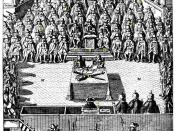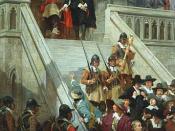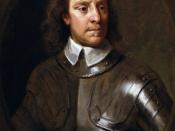In the thirteenth century, King John was a forceful and often unfair ruler of England. He punished citizens with no trial and made them pay heavy amounts of taxes. Finally, a group of nobles got together and forced John to sing the Magna Carta. The Magna Carta was a collection on documents that limited the rule of royalty in England, it guaranteed rights to all English people. The tradition of the Magna Carta carried on for centuries through Queen Elizabeth's reign, up until the Stuart family took up the thrown. In the 17th century, England developed into a limited monarchy.
Queen Elizabeth was the last successful monarch to rule alongside the English Parliament. Elizabeth had a lot of control over England and was generally a good ruler, yet she was not an absolute monarch. Elizabeth worked well with Parliament and allowed them to be involved in her reign. When Elizabeth died, Parliament was determined to gain more power over the government.
When James I, king of Scotland, took up the thrown, Parliament's determination and James's beliefs clashed to cause problems in the governing of England.
James was a firm believer in divine right. This meant that a monarch's power to rule came directly from God, and that therefore was absolute. He wished to have unyielding control of England, only going to Parliament when he needed money to fight a war, or to just to fund his excessive life-style. This irritated Parliament and was their basis for the resentment of James I. Parliament eventually began denying finances to James, and after a while he dissolved them and enforced his own taxes.
Supporting absolutist policies was Thomas Hobbes's book, Leviathan. Along with the Stuart monarchs, Hobbes was a believer in absolute monarchy as the top way to govern. Hobbes wrote of...


